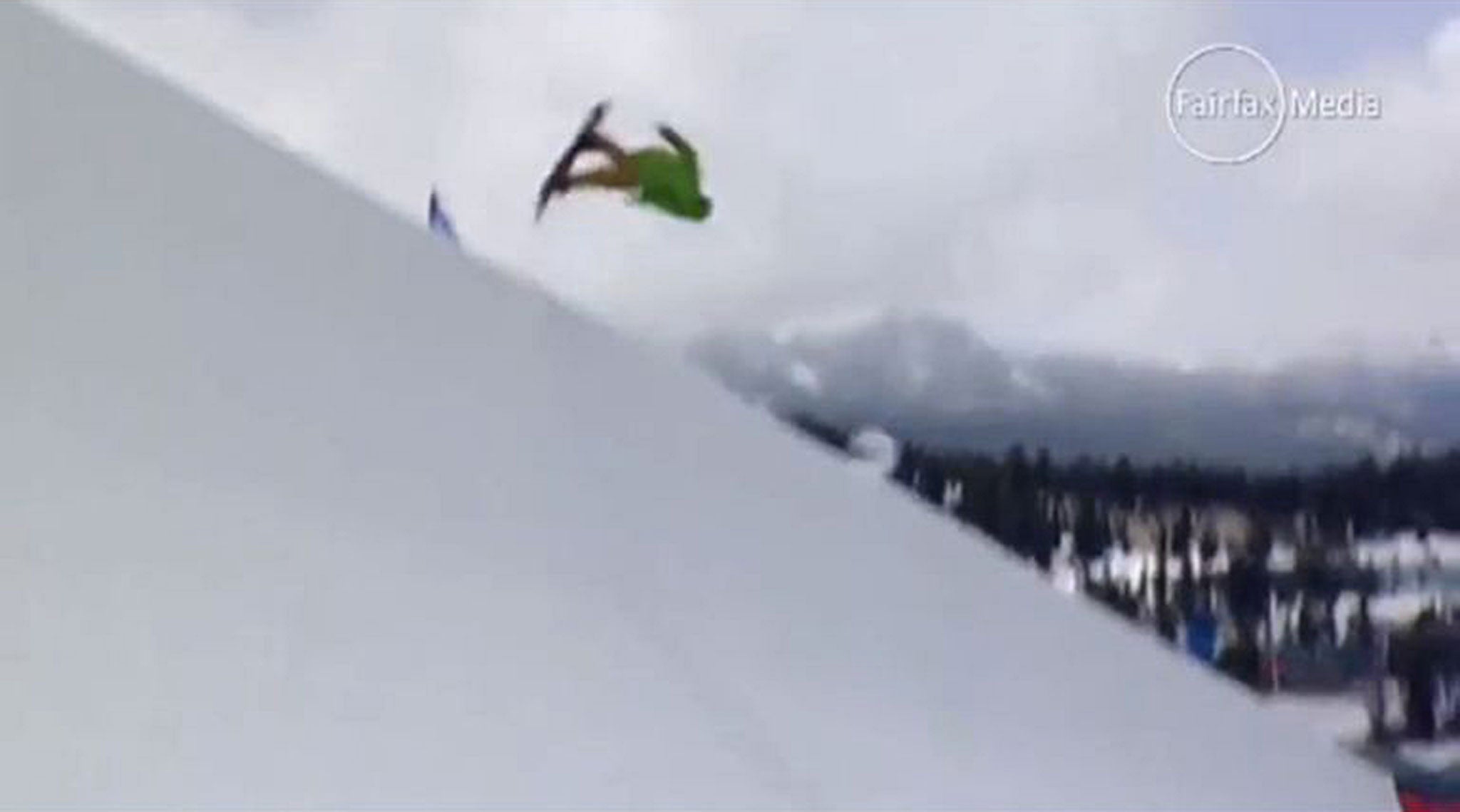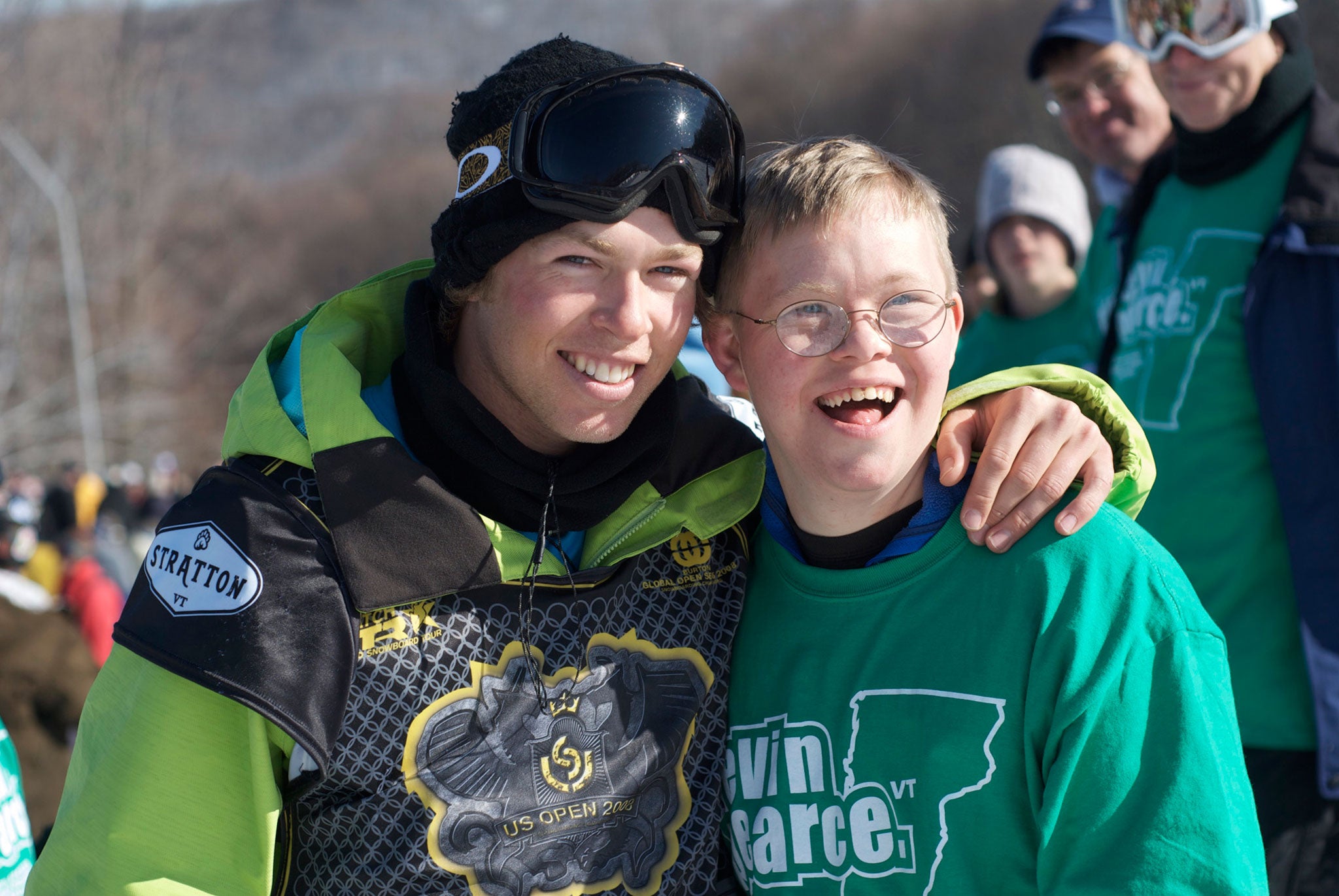The wake-up call: Kevin Pearce was the world's best trick snowboarder when his 'double cork' jump went wrong. Very wrong.
Would a six-day coma be enough to stop him from risking his life once more?
If life were like YouTube, you could have hit pause as Kevin Pearce floated above a Utah halfpipe on New Year's Eve 2009. Had you done so, you would have frozen the gracefully contorted figure of a kid high on life and at the top of his game. Pearce, who was 22, doesn't remember what happened next, or much of the following several months, but he remembers how things were, right up until that second of glorious flight.
"I realised but I never kind of put it out there but I was really good at snowboarding." He stops for a second to adjust the glasses that have helped rescue some of his vision. "I was really young, making a lot of money, getting to do the most fun thing in the world and travelling with all my friends to every country that has snow. It was the most amazing thing."
Pearce is being modest. The snowboarder from Vermont was better than really good. He had emerged two years earlier from the shadow of Shaun White, the seemingly unbeatable "Flying Tomato" who had a celebrity status more common to footballers or tennis players. Their fierce rivalry had lit up the halfpipe, a sloping furrow of compacted snow with banks 20ft high. Seven weeks before the Winter Olympic Games in Vancouver, Pearce was edging ahead for what promised to be a box-office showdown for gold.
But time does not pause like a YouTube video: hit play and you will see one of the hardest, longest falls in sport history. Pearce, who is now 25, had been practising a trick only a handful of riders could land in the halfpipe. The double cork requires three-and-a-half rotations with two-and-a-half inverted spins, an acrobatic feat that has to be viewed in slow-motion to be understood. From as high as 40ft, while spinning, the rider must spot his landing between the pipe's razor-sharp lip and concrete-hard floor. And he must be upright.
In Utah, Pearce gets it wrong.
The thud that comes early in The Crash Reel, a captivating new documentary about Pearce by the Oscar-nominated British director Lucy Walker, is the sound of a face breaking and a brain turning to mush. By the time the snowboarder's ragdoll body comes to rest below his horrified crew of fellow riders, he is already falling deep into a coma. The accident, caught on camera by a bystander, is tough to watch as it triggers a sequence of scenes of ratcheting human drama more riveting than anything that could play out in sport.

Shaun White goes on to double-cork his way to gold in Vancouver, unchallenged by his rival. But Pearce gains several more nemeses, each tougher and more complex than the last. Most pressing at first is brain damage. He emerges from a coma after six days but cannot register his surroundings. It is not clear how much of "him" will ever return. Head shorn after surgery and with holes for eyes, he appears barely more alive than he did in the pit of that pipe.
Relief comes after almost a month when Pearce mouths words for the first time – the lyrics to Neil Young's "The Believer". As his recovery gathers pace, the next biggest threat to his survival becomes Kevin Pearce. Another blow to the head could paralyse or kill him yet he is determined to ride again, at the same level, and get his old life back. In one scene in which Pearce appears to be joking (he isn't), he asks one of his doctors, "So, how hard can I hit my head again?"
"It looks crazy now but back then there was nothing concrete telling me I couldn't do it," Pearce says over breakfast at a London hotel. He has been travelling since January to promote the film and his new foundation, Love Your Brain. "People were telling me I had to stop but there was nothing that really proved it to me. My brain wasn't ready to give me the information that I couldn't do it any more."
This is where Pearce's family step in and steal the film. His father, Simon, a softly spoken Irishman, understands his son's passion. He, too, is dyslexic and struggled at school, but found what Kevin calls his "escape route" in craft – he is a celebrated glassblower. What he doesn't understand – and can't countenance after what his family has been through – is his son's determination to seek out yet more risk. During meetings around the dinner table, Kevin tells his parents and three older brothers that they don't realise how much snowboarding defines him.
"I loved that feeling of being under pressure and having to step up and land that single run," he explains now. "It's as scary as hell when you only have one chance and it's all or nothing, but that's what fired me up. It's also the only situation where I really thrived. I needed it."
Lucy Walker was initially drawn to extreme sports by the jeopardy that gives them such compulsive screen appeal. But when she met Pearce by chance the summer after his fall, her filmmaker's sense for a human story took over. She also quickly realised the documentary potential of the YouTube age, in which every trick, prank and crash is captured as a clip in the making.
"The footage came from 232 sources, from his family, friends, his sport," says Walker, who was nominated for Academy Awards in 2011 and 2012 for, respectively, Waste Land and The Tsunami and the Cherry Blossom. "We live in a world where so much video is being created and I think this is the first of a new kind of documentary, where you can seamlessly piece together footage to tell incredibly powerful stories."
The most arresting scenes come from Walker's own camera during her time with the Pearces, and in particular Kevin's brother, David. He knows what it's like to have a brain condition because he has Down's syndrome or, as he calls it, "up syndrome, because I'm an up kind of guy". While the rest of the family present Kevin with reasons why he shouldn't ever drop back into a halfpipe, and arrange meetings with stricken riders who have suffered a second brain injury, David simply tells his brother, through tears: "I just don't want you to die."
In December 2011, two years after his crash, Pearce straps back into his board. He looks great on wide-open pistes, but his balance and eyesight are off. When he enters a slalom race two months later, it is painfully clear – not least to him – that he's lost it.

Even today as he sits talking, he resembles and feels like the athlete he was – but his brain will no longer allow him to be. "It's so hard to have been that good at something and then be that bad and it being right in your face," he says. "But I had to prove to myself that I couldn't do it."
Pearce never went to college and doesn't want to blow glass. Instead, he and another brother, Adam, are now devoted to their campaign to help victims of traumatic brain injuries who lack the luck and support that saved Kevin. The film has also inspired a debate about safety in extreme sport. During the making of the film, Sarah Burke, the pre-eminent female freestyle skier, landed on her head in the same Utah halfpipe. She, too, spent days in a coma, but died after nine days. Her husband talks about her, while a sickening reel of other crashes confirms how vulnerable these athletes are.
Pearce rejects the idea, however, that they are pushed beyond reasonable limits by the sport. "It's the athletes who push it," he says. "It was me. Snowboarding is about freedom and if limits were put on it or if there were rules, it wouldn't work."
Four years since his crash, the stakes – and tricks – are even higher. Several more riders, though by no means all, can pull a double cork in the halfpipe, but Pearce says that Shaun White is, as he speaks, practising a triple cork at his private pipe in Australia. He had it built by GoPro, one of his sponsors, who have installed several cameras along the run to record his every move. "The double cork isn't even dialled in yet and they're already going for a triple," Pearce says. "It's crazy."
Pearce saw the documentary for the first time at its premiere at the Sundance Film Festival in January. "It really showed me what I had done to my family, what they had been through and how badly I needed them," he says. His parents have been inundated with tongue-in-cheek pleas from viewers seeking adoption, he adds.
The final scene is uplifting. Despite Kevin's realisation that his corking days are over, David remains almost obsessed with his brother's accident, pictures of which he studies alone in his room, and the idea of him attempting big tricks again. Walker returns to the Pearce home to capture their Thanksgiving dinner. Finally, Kevin convinces his brother he has come to terms with a new future, and that he must stop worrying.
Then, in a stunning emotional twist, Pia, the boys' mother, asks David whether hearing that Kevin is OK with his brain condition has taught him about accepting his own. David breaks down, and promises he will try. He also agrees to stop looking at the photos. "Have a picture of who he is now," his father says, with a hand on Kevin's shoulder. "That's what you want a picture of."
'The Crash Reel' launches the Sky Atlantic Documentary Films strand on Tuesday on Sky Atlantic HD. The DVD is out on 11 November
Join our commenting forum
Join thought-provoking conversations, follow other Independent readers and see their replies
Comments
Bookmark popover
Removed from bookmarks